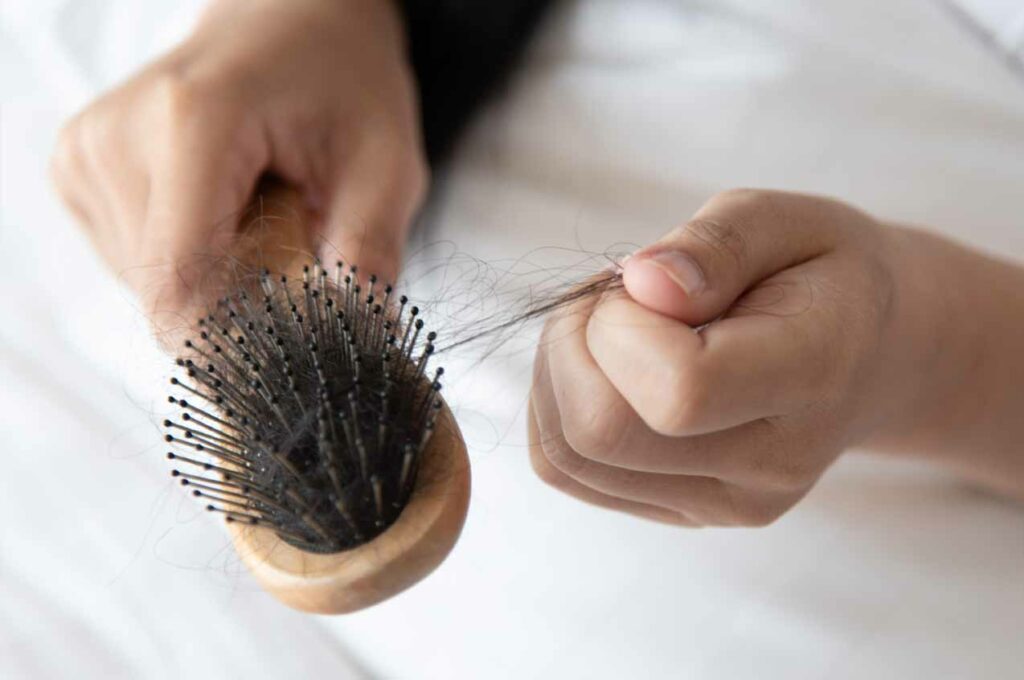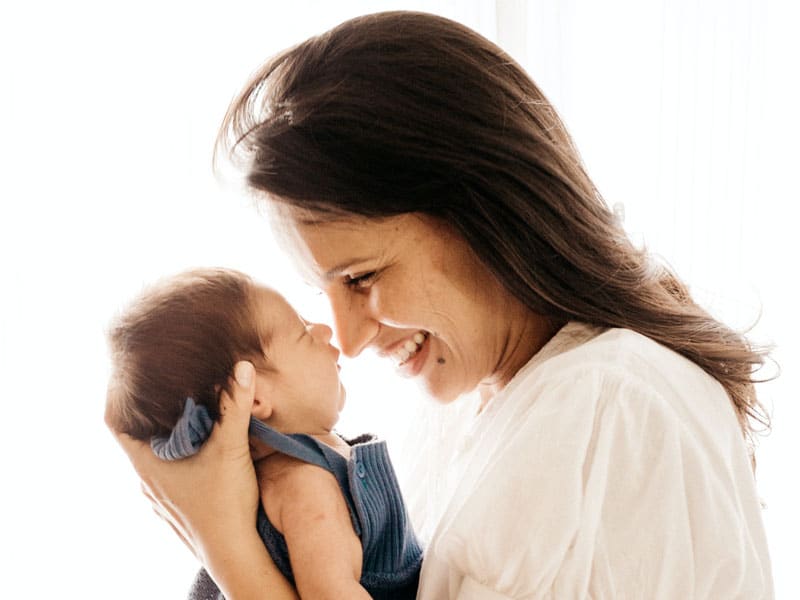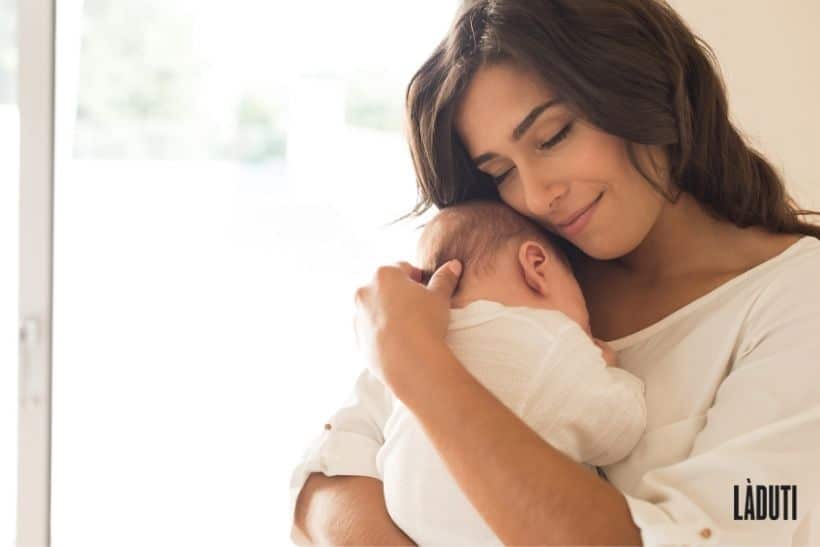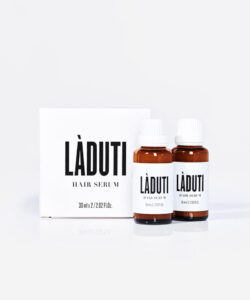During the Pregnancy increased oestrogen is released, which ensures that women are blessed not only with fuller but also shinier hair than usual. Skin and nails are also often particularly pure and healthy due to the increased oestrogen levels. But unfortunately, the opposite is often the case after birth. Especially during the breastfeeding period, women increasingly complain about thin, weak scalp hair, Hair loss as well as brittle nails and impure skin.
Which Causes does this sudden change have? And what can breastfeeding ladies do about it? This article will not only explain the triggering factors, but also provide possible helping measures.
With the baby comes hair loss
What could be better for a woman who wants to have a child than to hold her own baby in her arms, which she has carried under her heart for nine months? But every mother knows: not only a Pregnancy has its pitfalls. Some pregnant women complain of hair loss even before they give birth, and the period afterwards is also a real hormonal rollercoaster.

When the hair says goodbye with the estrogen
Once the child is born, the mother is no longer supplied with additional oestrogen. The growth phase (anagen phase) of the hair follicles is prolonged during pregnancy, which means that the hair then goes into a resting phase (telogen phase). If your hair grew better than ever while you were pregnant, it will fall out around two to three months after you give birth. For some mothers, this happens in clumps, as hair growth also decreases during the normal cycle.
Your body is sending you a clear signal: my hair roots are weakened. If you lose more hair after giving birth, you are suffering from so-called postpartum effluvium. "Post partum" means "after birth" and effluvium is the term used to describe increased hair loss. This form of Alopecia usually regenerates no later than nine months after birth.
Time for the right care
For most women, hormone levels normalise three to six months after childbirth and so does the life cycle of their hair.
For the time of regeneration, the following is wonderfully suitable Laduti Hair Growth Serumthat not only works without Minoxidil but is also free of hormones. Therefore, you can use it without hesitation not only during pregnancy but also during breastfeeding. Nevertheless, do not forget to make sure you have enough Vitamins and nutrients.
Causes and symptoms
Many women mistakenly believe that breastfeeding is the cause of their dwindling hair. However, hair loss is triggered by the fact that hormonal changes occur more slowly in breastfeeding women than in non-breastfeeding mothers. For this reason, the hair loss also starts much later, sometimes only after weaning. Breastfeeding itself is not the reason for your hair loss. Hair loss and you can take your baby to the breast with complete peace of mind.
When the hormones go crazy
Hormonal hereditary hair loss can be the reason for the hair problem, because some women are very sensitive to hormone fluctuations. This is because their hair follicles are sensitive to the sex hormone DHT. DHT is considered a metabolite of testosterone and is also produced in the female organism. Normally, the simultaneous release of oestrogen ensures hormonal balance. However, if the oestrogen level drops sharply, hormonal hereditary hair loss becomes visible.
How to recognize pathological alopecia?
The average lifespan of a hair is about two to six years. The fact that a person loses up to a hundred hairs a day is completely harmless and normal. If these fall out, new hair grows back in the same place.
Postpartum alopecia is particularly visible on the temporal region and the middle parting. If more than a hundred hairs fall out per day over a period of weeks, this is called pathological alopecia in medicine. But even this should not worry you. Normally, your organism will settle down again within a very short time.
Too little iron can be the trigger
However, if the hair problem persists over a longer period of time, a visit to the doctor is unavoidable. Talk to your gynaecologist and have a blood test done. Do you feel weak and have pale skin? Then a Iron deficiency the cause be. Your gynaecologist will prescribe a preparation for the nutrient deficiency.
Your iron level is in the green zone and you still don't feel well? Iodine plays an important role in pregnancy and during breastfeeding. In case of a deficiency or excess, a Thyroid disease conceivable. A referral to a dermatologist is also helpful to rule out both a skin disease and an infection.
What to do about hair loss during breastfeeding?

Especially women who have just given birth feel through Weight gain and other stresses of pregnancy increased discomfort. Hair loss can quickly become the negative culmination of all evil, which should be fought as soon as possible.
How to curb hair loss
After childbirth and during breastfeeding, you should not overexert yourself under any circumstances. Give your body the time and rest it needs for regeneration and health. StressLack of sleep or malnutrition are factors that promote hair loss. So try to get enough sleep, avoid mental stress and eat well. to have a balanced diet. Of course, this is not so easy with a child. Therefore, look for support among your family and friends.
Give yourself time
Don't be impatient, because regeneration requires a lot of strength and time. Even when the hormones have changed again and the hair roots have returned to their normal cycle, it usually takes a while for your usual mane to return. To support your body, pay special attention to the following tips:
- Relax with yoga, autogenic training or meditation
- Listen to your inner self: Shift down a gear when your body is running low
- Use gentle care for scalp and hair
- Wear your hair down, if possible, to Avoid tension and mechanical irritation
- Massage your head, this stimulates the blood circulation
- A new haircut can work wonders: Dare a new hairstyle, your hair will look fuller right away
Conclusion
You can be completely reassured. That breastfeeding is the trigger for hair loss is an absolute old wives' tale. Only completely natural hormonal fluctuations cause some women to lose their hair. Normally, your body regulates these fluctuations completely on its own. However, if the problem of dwindling hair still persists ten months after childbirth, or if you are plagued by symptoms of fatigue and malaise, you should have this clarified and consult a specialist.
To give the hair more structure and strengthen the follicles, we recommend the Products from Laduti. Combine this with a gentle scalp massage and support the blood circulation of your scalp.
FAQ - Questions and answers
Why does hair loss occur during breastfeeding?
Postnatal hair loss begins after birth and has nothing to do with breastfeeding per se. If you lose hair after pregnancy, the cause is the imbalance of your hormones, which is delayed by breastfeeding.
When does hair loss start during breastfeeding?
Hormonal alopecia occurs about two to three months after delivery and thus falls during the period of breastfeeding.
What helps for hair loss during breastfeeding?
Make sure you eat a balanced diet, get enough sleep, nutrients, relaxation, gentle hair care and try to keep stress levels as low as possible. If you are concerned about hair loss or if it continues for a disproportionate amount of time, see a doctor. Have blood work done and rule out possible thyroid disease as well as inadequate iron intake.



